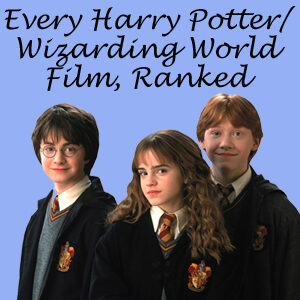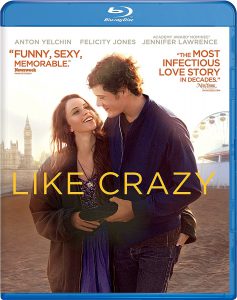Like a less-dark version of 2010’s “Blue Valentine,” “Like Crazy” (2011) zeroes in on one couple and follows them through the ups and downs of their relationship. “Blue Valentine” has more downs and “Like Crazy” has more ups, but they’re both intimate rom-droms (romantic dramas) that demand great performances in the central roles.
You’ll fall in love with Felicity Jones within the first 10 minutes; she plays Anna, a British writing student on a visa to study in Los Angeles. She has a wonderfully expressive and naturally beautiful face that plays better in motion pictures than in still pictures, like a cross between Fiona Apple, Alexis Dziena and Michelle Trachtenberg. Known mostly for U.K. projects, this won’t be the last we see of her.
Anton Yelchin is more of a cipher as budding young furniture designer Jacob, a bit too-cool-for-school in a lot of scenes. I remember him as a kid in “Hearts in Atlantis,” and while he certainly has grown into a movie star’s good looks, I feel like he somewhat underplays his role here.
The most important element is there, though: I believe these two love each other. Enhanced by the film’s improvisational touch, their love seems painfully, crazily real, causing them to jet across the Atlantic to visit each other even though neither can really afford it. But thanks to economic realities and the fact that Anna brazenly overstays her student visa allotment, they are forced to spend months at a time apart. During this time, they try to lose themselves in their work (both are extremely good at their jobs, she as a magazine editor, he as an architect of chairs) and — uh-oh — other love interests.
Like a Facebook relationship profile status, it’s complicated, even for the viewer. Simon (Charlie Bewley) is ultimately just a poor schmo who loves Anna (to see this type of character in a central role, check out Charlize Theron in “Young Adult”). But Jacob’s other significant other is Samantha, and because she’s played by Jennifer Lawrence (about to become a movie star in “The Hunger Games”), she registers as a fully formed, sympathetic character in just a few scenes.
So many romance movies, especially romantic comedies, force a conflict on their lovebirds (usually an innocent misunderstanding lazily blown out of proportion by the writers). But the ocean and bureaucracy keeping Anna and Jacob apart seem genuine. Also genuine, for better or worse, are their human foibles — they may be perfect for each other, but neither is a perfect person.
“Like Crazy” is, in a way, about memory. And like the lost-memory film “Memento,” I kind of wish “Like Crazy” played backwards, so it could position those giddy, giggle-worthy first few minutes as the overriding, lasting images.
Instead, in a believable reflection of all chronologically trapped relationships — even successful ones — Anna and Jacob are grasping behind them at those early days. When they’re apart, their happy memories cause pain; when they’re together, well, that’s when the beautiful tragedy turns into raw reality.

And if it feels like voyeurism to peek in on their bedroom moments, it’s the moments of bickering in the kitchen where I cringe and want to yell: “You love each other! Knock it off!” The thing is, Anna and Jacob are probably both thinking it too, and thinking back to those wonderful first days.
Love conquers all? Well, yes, but not entirely in a good way. “Like Crazy” can’t live up to the idealized idea of love exuded by the first part of the film, but I think that’s also kind of the point.

